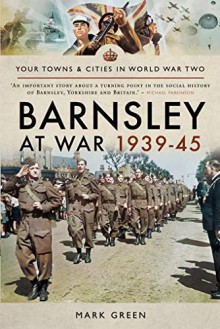
I thank Rosie Croft from Pen & Sword for providing me a paperback copy of this book that I freely chose to review.
This volume is one in a series about different towns and cities during WWII in the UK, called Your Towns & Cities in World War Two (for those interested, Pen & Sword also publishes a similar series about towns and cities during WWI). I was particularly interested in Barnsley because I used to live in Penistone, a town within Barnsley Metropolitan Borough, and I spent a fair amount of time in Barnsley and the surrounding area, so I was curious as to how life must have been like at the time in the area (beyond the visual reminders, like monuments and parades). Each book is penned by a different expert, so the writing might differ, but if I were to judge by this one, anybody interested in researching in more detail what life was like during the war in a particular area of the UK would find plenty of useful material in this collection.
The book, which contains a detailed index and end notes that can serve as a bibliography, is peppered with photographs, maps, propaganda posters and advertisements, and images taken directly from newspapers which illustrate the text, from maps of the German bombers targets in the area (in Sheffield, a few miles South, they manufactured parts for the RAF planes, and it was therefore a target and suffered heavy bombing in 1940), posted silhouettes of the German planes and images of their uniforms, so the population could recognise them, pictures of the men and women who helped in the war effort (both home and abroad), the bomb shelters, a gas hood for babies (it looks right out of a sci-fi movie)…
The four chapters follow the war effort in Barnsley in chronological order, from the preparation period (detailing the ARP’s [ Air Raid Precaution] efforts to recruit people in the whole area, also talking in detail about the poor living and working conditions in some parts of the town, especially for those working at the local collieries [George Orwell visited and reported on what he saw], it also mentions those men from Barnsley who went to join the International Brigades in the Spanish Civil War [Thank you], the building of air shelters and the reuse of some facilities for training and as shelters; to what became known as “the Phoney War”, because for eight months, after war had been declared, nothing much seemed to happen, although there were plenty of preparations and movements taking place (for some soldiers who had never travelled abroad it felt like a vacation, while at home they were practicing imposing blackout —there were several deaths and a large number of accidents as well until people got wise to the risks—, rationing, and an increase in manufacturing); then when Germany invaded the Low Countries and France, we have more rationing, the first men start dying abroad including the first British soldier killed in France, Private William Roper, who although living in Dewsbury at the time of the war, was born and spent his childhood in Barnsley, the women joining more actively in the war effort, heavy rationing, children refugees arriving from some of the heavily bombed areas (there are letters and personal accounts included as well)… And finally, after the victory, we have the celebrations, of course. The book does not shy away from talking about some of the less than edifying incidents, like crime and robberies taking place during the period, and hate incidents towards some of the allied troops visiting the area (including an incident in Penistone when an African-American soldier was assaulted outside a pub, although seemingly not by locals), and it is a fairly complete chronicle of all aspects of life in the area during WWII period.
As a small but representative sample of the book, I thought I’d share a fragment of a letter by Gunner William Barraclough, a Barnsley hero, summing up the British spirit of Dunkirk, which brought a smile to my face: ‘we had a hot time, but we’re not licked yet —not by a long chalk.’
I cannot sum up the whole book, but I am sure anybody from the region, or interested in researching the local history of that area, will find plenty of useful information about what was happening in the area, and also about what happened to the locals who were mobilised during the war. This would be a perfect present for relatives or friends who remember the era or are interested in it, and also for anybody wanting to become better acquainted with that period of UK history at a local level.

 Log in with Facebook
Log in with Facebook 





